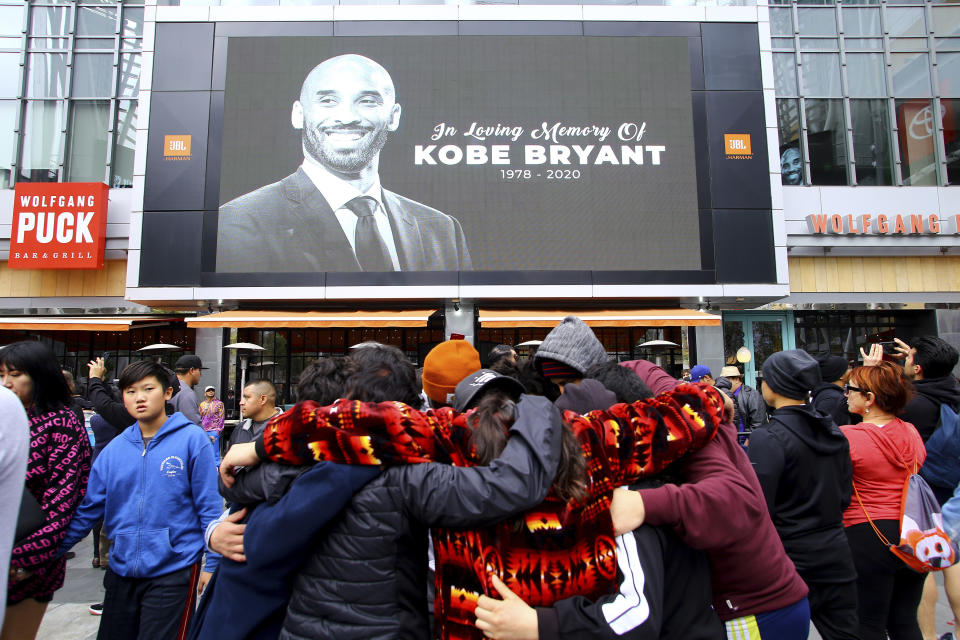Why Kobe Bryant was a different breed of superstar
When I first read the news, I scanned my mind for other Kobes I know. Six hours later, I still can’t believe I’m typing this: Kobe Bryant is dead at 41, alongside eight other people, including his daughter, Gianna, in a helicopter that crashed en route to his perpetual destination: a basketball game.
In the time between when the news broke and traditional outlets confirmed it, I found myself wondering if it was a hoax, not only because I wanted it not to be true, but because it’s hard to imagine Kobe Bryant ever dying.
Not because of the statue outside Staples Center, where fans across Los Angeles gathered Sunday to honor him, that will immortalize him forever. Not because of the aura of invincibility that Bryant so carefully cultivated. But because it was always so easy to see through.
Bryant will be deified as a winner, a five-time champion, a hero, the icon who had no quit. He had also, at different times, lost and failed and quit. He made it look easy and he made it look hard, like the weight of the world was on his shoulders, and it was almost too heavy. He was a failure who never allowed himself to be defined by failure. He was willing to do what others wouldn’t, sometimes to a fault. No matter what, he kept getting back up.
Hell, he stood up and nailed his free throws after tearing his Achilles tendon.
It’s hard to imagine Bryant not getting up again. It’s hard to imagine him ever dying, him ever being dead, because even in failure, he was always doing. You described Kobe with verbs, not nouns. You described what he did, not what was done to him. He was enduringly alive. He wasn’t supposed to be a “was”. He always looked more vulnerable than we like to remember, but he always skirted that vulnerability by turning it into a strength, taking the same shots he kept missing, despite how ill-advised and unlikely they were.

In the second round of the 1996-97 playoffs against the Utah Jazz, a rookie Bryant dribbled up the floor, dropped his shoulder, drove to the right, and pulled up for a potential game-winner 16 feet from the basket, like he would so many times in his storied career. The shot famously air-balled, as did three more in overtime. Nineteen years later, in his final game, the same guy dropped 60 points against the same team.
You either loved how much he was willing to fail or despised how much he got away with it. In the end, the successes covered up the failures, just the way he drew it up. Bryant, who won an Oscar and hosted the ESPN show “Detail” after retirement, was an unreliable but exceptional storyteller.
For his willingness to fail, he drew ire from haters and devotion from the fans who blow wind in the sails of his legacy, who took inspiration from him on and off the court, where career field-goal percentage doesn’t matter as long as you keep trying and pull it out in the end.
But life on the court is tidier than life off the court, and the stories we tell about players on the court can have a troublesome way of trickling into more complex off-court situations.
It would feel dishonest to not acknowledge that the lens through which Bryant’s career has been analyzed has also framed the low point of his public life, when he faced sexual assault charges in Colorado, where his actions were at best adulterous and at worst criminal. After the charges were dropped and his re-admittance into public life, the scandal was treated like errant shots and lost games: a setback to be overcome with Mamba Mentality.
Bryant was complicated. Bringing up the charges today feels complicated too, but everyone is every part of themselves, their best and worst moments, and we are all better served when we are willing to remember everything, especially about icons. In Bryant’s case, the charges redefined his career arc. He went from the glossy, smiling guard collecting Michael Jordan’s old endorsements to the heel with the clenched jaw. It’s worth noting that the narrative that inspired so many fans resembled the one that repurposed him as a digestible villain. We can and we should celebrate some of his legacy without celebrating all of it.
Bryant was great at many things. He was his successes and his failures. His failures even lived in his successes — like going 6-for-24 in Game 7 of the NBA Finals in 2010 but winning it all. The man and the myth walked in lock-step with each other. He was an exacting striver, aiming for perfection that constantly eluded him yet never dissuaded him. He never quite walked the tightrope for long enough to make you forget he was human, but he was exceptional because of how hard he tried to transcend that humanity.
More from Yahoo Sports:
